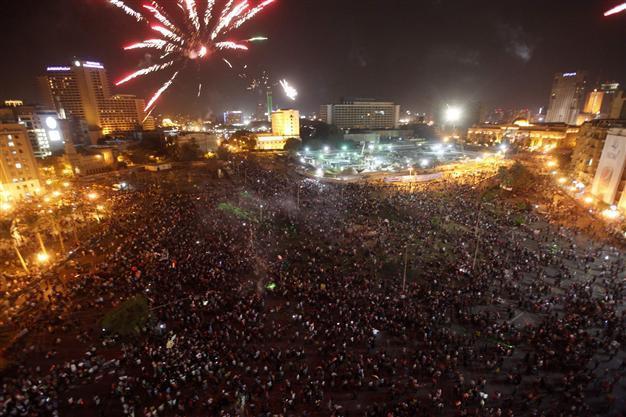Sisi wins Egypt presidential elections with 96.9 percent of vote
CAIRO - Agence France-Presse

Egyptians gather in Tahrir square to celebrate former Egyptian army chief Abdel Fattah al-Sisi's victory in the presidential vote in Cairo, June 3. REUTERS Photo
Former army chief Abdel Fattah al-Sisi was declared Egypt's president-elect June 3, winning 96.9 percent of the vote in an election nearly a year after he toppled president Mohamed Morsi, whose Islamist allies boycotted the polls.
Voting last week was extended to three days amid fears of low turnout, which election commission head Anwar Rashad al-Asi said was 47.45 percent at a press conference announcing the results.
Sisi's lopsided victory had been certain, with many lauding the retired field marshal as a hero for ending Morsi's divisive rule in July. Sisi's only rival, Hamdeen Sabbahi, won just three percent of the vote.
Saudi Arabia's King Abdullah, who opposed Morsi's Muslim Brotherhood, immediately called for a donors conference to help Egypt after the results were announced.
With an economy hammered by years of unrest, Sisi urged Egyptians to "work to return security to this nation," in a television address after the final results were declared. "The future is a blank page, and it is in our hands to fill with what we want ... bread, freedom, human dignity, social justice," he said.
Sisi's appeal mirrored the slogan of the 2011 uprising that overthrew dictator Hosni Mubarak, as his critics warned the retired field marshal could impose an even more repressive government.
Morsi's Brotherhood, crushed by a massive crackdown following his overthrow and detention, had boycotted the vote.
At least 1,400 people, mostly Islamists, have been killed in street clashes with police, and more than 15,000 people have been arrested.
The crackdown has extended to secular dissidents who spearheaded the uprising against Mubarak, with several of their leaders imprisoned for holding protests against the army-installed government after Morsi's ouster.
The lower-than-expected turnout in the election - Sisi himself had urged more voters to come out - signalled a wide segment of the population was apathetic or boycotted the election.
Morsi won a 2012 election with 51.7 percent of the vote, out of a turnout of 52 percent. He quickly alienated many Egyptians and last year mass protests demanding his resignation erupted.
In Cairo's Tahrir Square, where protesters had battled police three years ago in an uprising to overthrow dictator Mubarak, several thousand Sisi supporters celebrated and set off fire works.
"We are celebrating the hope of restoring stability and security," said Naela Mahmoud, a school principal.But her daughter, Hala Abu Fadl, 29, recalled the past violence in the iconic square, once synonomous with rebellion against Mubarak and the army, which took over between his overthrow and Morsi's election in June 2012.
"Celebrating here is difficult," she said, pointing to a mural depicting a slain protester, at the entrance of a street where activists clashed with police and soldiers in 2011. "I voted for Sisi for stability, but I fear a crackdown on freedoms," she said.
Sisi will take office by the end of the month, with interim president Adly Mansour likely returning to his previous post as chief judge of the constitutional court.
Sisi, appointed by Morsi as defence minister before he overthrew him, has suggested he would not tolerate protests as he moved to restore the battered economy.
More than three years after Mubarak's overthrow, the economy has tanked with unrest driving away much needed tourist revenues and foreign investment.
Sisi's main challenge will be to restore stability and attract tourists and investors again.
Following Morsi's overthrow, the interim government unleashed an extensive crackdown that killed at least 1,400 people, mostly Islamists, in street clashes. Militant attacks have killed almost 500 policemen and soldiers, mostly in the restive Sinai Peninsula bordering Israel and the Gaza Strip.
The interim government has been propped since by billions in Gulf aid, mostly from Saudi Arabia and the United Arab Emirates, which also swiftly congratulated Sisi on his victory.
